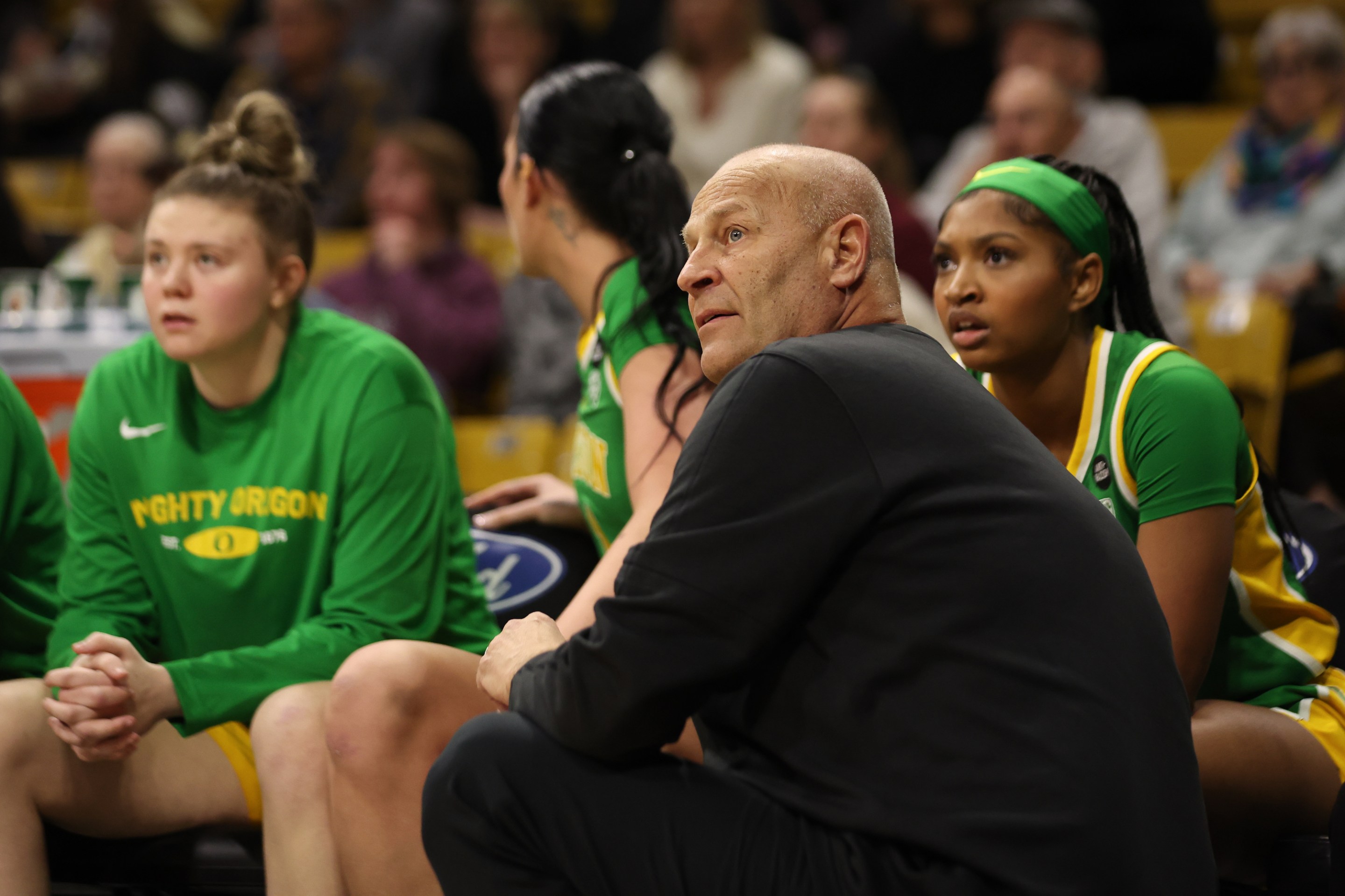The conference that gives me the most hope for women's college basketball—that it can be invested in and appreciated for all its fun and richness—is about to die. Still, my hope persists. All season long in the Pac-12, I saw a profound belief of mine enacted: that any school can be a women's basketball school. The proof was in Cameron Brink and perennial power Stanford still looming over everyone, in JuJu Watkins resurrecting the old glory of USC, in the resilience of Oregon State and the any-given-night punch of Arizona, Wazzu and Cal. I saw it in the machine Lynne Roberts has built at Utah, in UCLA's freakishly young stars, and in Colorado beating the national champions on TNT. Whatever the results of this week's conference tournament, the Pac-12 has left a fine last impression.
But Oregon is a more complicated story. On Wednesday, the Ducks lost their first-round game to No. 18 Colorado by the worst margin in Pac-12 tournament history, a 79-30 disaster that head coach Kelly Graves called, generously, “difficult to watch.” They'll miss the NCAA tournament for a second straight year, and finish the season 2-16 in conference play, the last 13 of those losses uninterrupted. It was strange to hear Graves at the postgame press conference, trying to account for the state of his program. “I can’t really pinpoint one reason why it’s fallen off,” he said. For the first time, he sounded like an ineffectual leader at the end of his tenure. If only there were a phrase for that.
Four years ago, Oregon was among the women's basketball powerhouses. The Ducks produced three top-10 picks in the 2020 WNBA draft, the best of them a national phenom named Sabrina Ionescu. She left Oregon with a signature shoe deal and oodles of hype. At the time, the program's future seemed equally bright: Graves recruited five five-star players to the 2020 incoming class. For a couple of seasons after Ionescu left, the Oregon women on average outdrew the men.
Not one of those five-star players celebrated Senior Day as a Duck last week. The last to stick around, Te-Hina Paopao, transferred to South Carolina this year, where she's been the most efficient three-point shooter in women's basketball. Their curiously big and mostly thriving transfer diaspora—Sydney Parrish at Indiana, Jaz Shelley at Nebraska—might bring shame upon Oregon, but the Ducks have done a lot of that themselves this season, losing non-conference games to far less talented schools like Portland and Santa Clara. Why do civilizations collapse? How does a championship contender with a No. 1 recruiting class end up, four years later, letting Utah Tech go 21-of-31 from three?
As I watch turnarounds at all kinds of women's basketball programs, I've been thinking a lot this season about how easily individual triumph is confused with broad transformation. Success stories are interesting, but the post-success story is even more interesting. Graves still recruits at a high level, but never seems to get the best out of his teams. Lately, players don't get better at Oregon, nor do they stick around. It's hard to look at Oregon women's basketball right now and see that any real mark was left by Ionescu, Satou Sabally, and Ruthy Hebard. That's a shame. A great player can raise expectations or set a certain standard, but there has to be some institutional commitment to maintaining that standard afterward, to ensuring that all the support and momentum built for their program won't just fizzle away. It's not like the school in question is hard up for cash.
“I don't worry about that,” Graves said in mid-February, answering questions about his job security after the Ducks' ninth straight loss. “We’re the ones who set the bar here.” He meant that in the decade before he took the job, Oregon hadn't made an NCAA tournament. The best case he could make for himself was the ever-fading memories of Ionescu hitting a stepback against Mississippi State. Maybe things aren't so good right now, but when they were so good, it was because of him, so what more could you want?
I’m usually grateful that football, and not women’s hoops, is the province of message-board psychos and desperate boosters. College sports are bound up in sentiment; so many decisions are governed by nostalgia, impatience or plain ruthlessness. Perhaps it is ruthless to call for Graves's head: He has five years left on the contract extension he signed in 2021. This will be his first losing season at Oregon since he arrived there in 2014, and just the third with a losing record in conference play. “He’s built up plenty of goodwill,” Bill Oram wrote in an Oregonian column last month on the “steep decline of Oregon women’s basketball.”
But message-board spirit can be healthy in small doses. The hot seat, as a concept, has value here. It declares a program bigger than one coach or player. It says women's basketball can be more than a feel-good story on campus when they win—women's basketball should be a feel-bad story when they lose. Thank you very much for setting the bar, but it's still your problem if you can't meet it.






